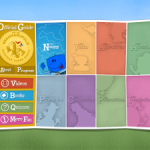August 10, 2012
Weekend Website #112: The Babakus
Every Friday, I share a website (or app) that I’ve heard about, checked into, and/or gotten excited to use. This one is an app directed at kids who require a special approach to learning math. Since ‘math’ is by far the most popular search term of readers who seek out my blog, I know you’re going to enjoy this review.
Age:
Fifth grade and up–homeschoolers, students, computer lab, classroom
Topic:
Math, special needs
Address:
Review
Here’s what iTunes says about Babakus: “The Babakus is a calculator that combines the best qualities of the western slide ruler with those of the eastern Abacus. It’s part of a method for students with dyscalculia or math disability. You can easily work with addition, subtraction, multiplication and division using the Babakus.”
All true, but it falls far short of what this amazing app will do.
Let me back up a moment. Babakus caught my attention because I’ve been looking for proof positive that technology can positively impact the special needs of some of our most needy students. Those learning disabilities that start with Dys–(dyscalculia, dysgraphia, dyslexia) are close to my heart because my son has one of them. I saw how he struggled and might have given up if we hadn’t identified a solution early in his educational career. Now he’s a successful adult, comfortable pursuing education in the way that works best for him, with good memories of the variable paths he took to excel at learning.
Babakus addresses students with Dyscalculia, which is difficulty with time, measurement, and spatial reasoning. It affects 3-6% of individuals and is not always identified as the learning disability it is. Often, it seems that students just ‘don’t understand’ math, its presentation, the teacher’s calculations and think they simply aren’t a math person when the plain truth is that their brain operates differently than their neighbors–nothing less and nothing more. A 2005 study in the U.K. found that consumers with low numeracy skills earn less, spend less, get sick more and are more than likely to have run-ins with the law. Sometimes all that is required is a different approach to teaching calculations and the students will be fine. Isn’t it worth the try?
Technology has offered that sort of special education alternative for over a decade now and been a boon to children who aren’t created from a cookie cutter, but when I went looking for specific examples of tech helpers, I had difficulty finding them. Much of what’s out there is traditional programs used in creative ways by clever teachers.
That’s good–important–but I wanted to find tools that spoke directly to the need, not tangentially. I found that in Babakus, designed as a hybrid of the western world’s slide rule and the eastern culture’s abacus. It was invented by a neuropsychologist Bjorn Adler, who recognized a specific need in some students who had difficulty working with numbers and figures. Traditional education teaches math via boxed systems like Everyday Math or Singapore Math or any number of other systems, but they are geared for the majority, which means those on the fringe–those with creative brains that work in different ways–don’t hear the math the way they can learn. Where that has been challenging in the past, now with programs like Babakus, we can offer methods that speak to their learning capabilities.
The Babakus is used for all conventional math functions–addition, subtraction, multiplication, and division–as a visual aid representing the relationships between numbers and figures. Think of it as a high-tech replacement for counting on fingers. There are three screen options to accommodate up to seven-digit numbers and can be used by any student from age 6 to adult. It is especially beneficial for students with mathematical difficulties, and those who have trouble automatizing simple calculations. The app includes exercises in nine different difficulty levels, enough to challenge any student, as well as explanations for both teachers and students. I was pleased to find an extensive training program of YouTube videos to teach all the basic functions. It’s a flexible approach, too: In settings, the user can identify what type of measurement they are using, such as meters, kilograms, liters or a measure of the users own choice.
In the words of the founder, Mr. Adler, here’s his goal for Babakus:
We see that many students after a five-week training period have taken a great step forward. Students who exhibit specific difficulties in mathematics / dyscalculia often have great difficulty automating even simple numerical facts. They are often stuck in the finger-counting phase, and there is a high risk that they end up on the low level of skill and understanding. When the student is having problems automatising simple numerical facts, his/her working memory is more burdened than what is desirable, while the ability to learn new things is hampered. Here, The Babakus fills an important role, since the method is working memory efficient when necessary. At the same time, the method can be used to stimulate and improve working memory capabilities once the student is proficient enough with the calculator.
The Babakus is one of those wonderful apps every school should have available to students as an alternative method of performing math functions . It should be required introduction to any student who doesn’t seem to ‘get’ the traditional method before they give up on themselves.
To sign up for Weekend Websites delivered to your email, click Weekend Websites here.
_____________________________________________________________________________________________________________
Jacqui Murray is the editor of a technology curriculum for K-sixth grade, creator of two technology training books for middle school and three ebooks on technology in education. She is the author of Building a Midshipman, the story of her daughter’s journey from high school to United States Naval Academy midshipman. She is webmaster for six blogs, an Amazon Vine Voice book reviewer, a columnist for Examiner.com, Editorial Review Board member for Journal for Computing Teachers, IMS tech expert, and a weekly contributor to Write Anything. Currently, she’s editing a thriller for her agent that should be out to publishers this summer. Contact Jacqui at her writing office or her tech lab, Ask a Tech Teacher.







